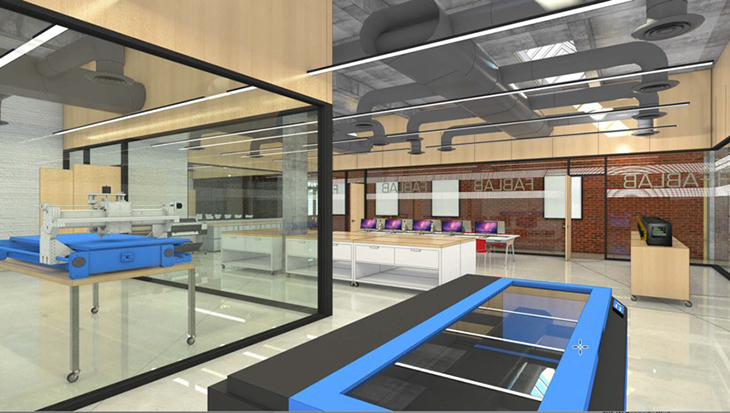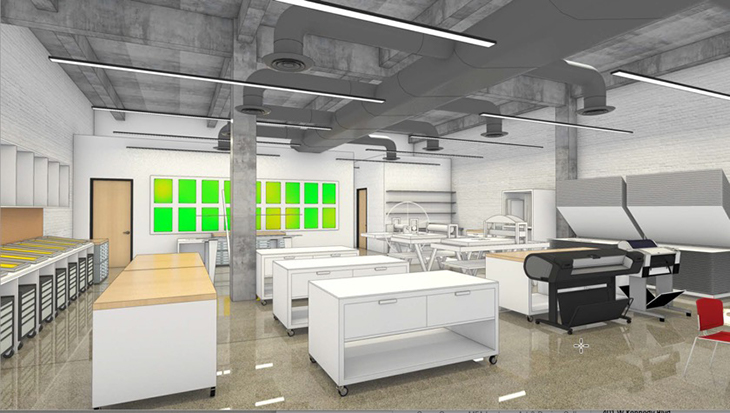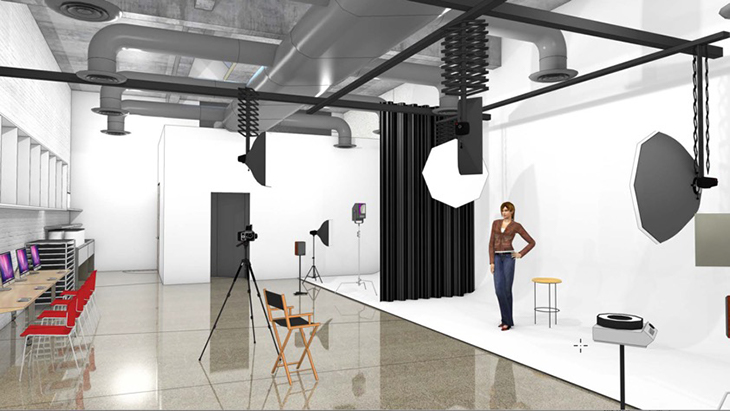Published: October 24, 2018
UT to Rebuild Arts Studios Into “Maker-Space” to Foster Creativity and Innovation
The University of Tampa will rebuild part of its Bailey Arts Studios on campus to host one of the most forward-thinking visual arts programs in the country, offering spaces for innovation and creativity amongst student and faculty inventors, designers, entrepreneurs and artists.
Most notably, the project will include construction of a digital fabrication lab (the Fab Lab) that will be an entrepreneurially focused, collaborative maker-space for students and faculty to turn their ideas and dreams into prototypes and products. The space will include laser cutters, 3-D printers, computer numerical control (CNC) routers, large format printers, vinyl cutters and state-of-the-art computer technology.

Most notably, the project will include construction of a digital fabrication lab (the Fab Lab) that will be an entrepreneurially focused, collaborative maker-space for students and faculty to turn their ideas and dreams into prototypes and products.
The project is set to be completed in the spring semester.
Art and design students — from the freshman year on — will have access to the Fab Lab, which at other universities is usually reserved for graduates in engineering, architecture or the arts. Additionally, the Fab Lab will be available for UT students from various majors.

“According to Chris Valle, all of the rebuilt Bailey Arts Studios spaces will take their design cues from the edgy and collaborative vibe that is the standard in tech startups and other creative, professional spaces.
“Virtually anything can be created in a fab lab, even things we haven’t dreamed of yet,” said David Gudelunas, dean of the UT College of Arts and Letters. “Yet most fab labs are at large research institutions or affiliated with major think tanks, and it is an even smaller list of elite institutions that make these technologies available to undergraduate students.” Only 4 percent of colleges and universities in the country have a fab lab.
In addition to the Fab Lab, the rebuilt Bailey Arts Studio will include:
- A modernized, state-of-the art photography studio and darkroom complete with professional-grade lighting studio and staging areas as well as an environmentally friendly dark room.
- Two new high-tech classrooms that encourage interpersonal and technological engagement to support the growing graphic design major, and the digital arts generally.
- A re-imagined printmaking studio with safety and technological improvements that diversifies the printmaking capabilities and combines traditional processes with new emerging digital tools.
- Enhancements to the Scarfone/Hartley Gallery, one of Tampa’s premier art spaces.
According to Chris Valle, all of the rebuilt Bailey Arts Studios spaces will take their design cues from the edgy and collaborative vibe that is the standard in tech startups and other creative, professional spaces. “These new spaces are a physical manifestation of the vision of the art and design department and the College of Arts and Letters,” said Valle, chair and professor of art and design. “Art and design majors will have access to spaces that are as imaginative and aesthetically focused as they are. It is a perfect match.”

“Art and design majors will have access to spaces that are as imaginative and aesthetically focused as they are,” said Valle. “It is a perfect match.”
The Bailey Arts Studios, which is located on North Boulevard next to the Martinez Athletics Center, was originally developed in 2002 after a naming gift from the Bailey Family Foundation. The building is, and will remain, approximately 30,000 square feet.
Project architects are Eric Kreher and Bob Shumake, and the general contractor is Friedrich Watkins.
The rebuilding will be paid for through individual gifts and University funds.
In alignment with UT’s commitment to environmental stewardship, the building will be designed and constructed to be a candidate for Leadership in Energy and Environmental Design (LEED) certification by the U.S. Green Building Council.
